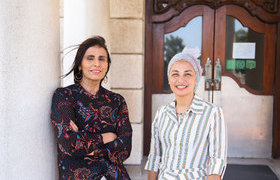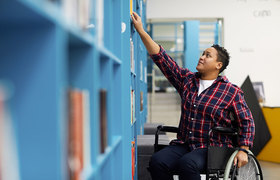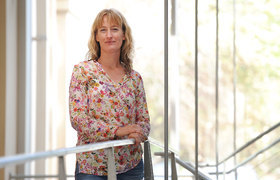Disability Rights Awareness Month: Creating an inclusive, transformed campus community
29 November 2022 | Story Niémah Davids. Read time 10 min.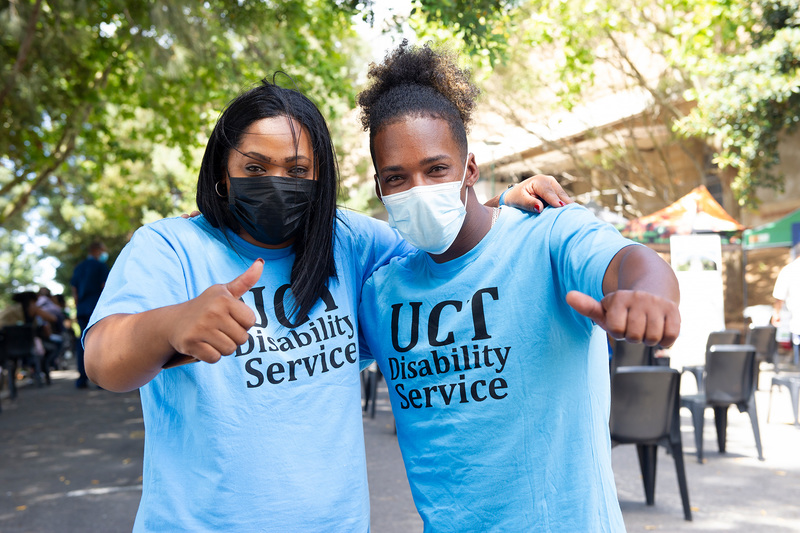
“When you focus on someone’s disability, you’ll overlook their abilities, beauty and uniqueness. Once you learn to accept and love them for who they are, you subconsciously learn to love yourself unconditionally.” – Yvonne Pierre, The Day my Soul Cried: A Memoir.
And creating inclusive, non-discriminatory spaces – in places of learning and working; in shopping malls and playparks; at the post office; and at the local supermarket – is the bedrock of this fundamental mind shift. It’s for this reason that the University of Cape Town (UCT) supports this important global transformation project, which also happens to be at the heart of its Vision 2030, and essential to ensuring that all staff and students unleash their human potential to create a fair and just society. Through advocacy, UCT’s Disability Service – a subset of the Office for Inclusivity & Change – is committed to catapulting this change by championing the rights and well-being of staff and students with disabilities.
This Disability Rights Awareness Month, UCT News put questions to colleagues in the Disability Service unit. These talking points touched on their role and responsibility as a fundamental office within the university, as well as how they support UCT’s growing cohort of staff and students with disabilities.
“In order for students with disabilities to be actively involved in their academic programmes and campus life, they need to be adequately accommodated on campus. This is where Disability Service steps in. Our list of provisions is endless: from notetakers, to assistive software, and even negotiating for flexible deadline dates on assignments, we’ve got you covered. We are there to support students and staff every step of the way,” said Disability Service’s Lesego Modutle.
Navigating campus
Currently, the university has registered 223 students with disabilities and 33 permanent members of staff, and the specialised on-campus support services available to meet the individual needs of students and staff with disabilities vary. For students who are Deaf, Modutle said the university provides Sign Language interpreters during lectures, tutorials and public UCT events like graduation ceremonies, as well as during tests and exams. Similarly, she added, for students and staff who are blind or visually impaired, part of their orientation programme involves mobility training to familiarise themselves with the university setting and to help them successfully navigate UCT’s campuses. How to get to and from class, to the Disability Service centre, and to their residences at the end of the day also forms part of this training programme. And for those who use guide dogs or who are white cane users, the university partners with the South African Guide Dog Association and League of Friends of the Blind respectively to provide students with the necessary navigation training. UCT also offers a similar but different service to students and staff who are wheelchair users, and the orientation and mobility training programme is tailored to their individual needs.
“The programmes we have in place for students and staff with disabilities ensure that they are able to orientate themselves with the campus community in order to feel at home in this space.”
“Not knowing our way around a place can be hugely unsettling. The programmes we have in place for students and staff with disabilities ensure that they are able to orientate themselves with the campus community in order to feel at home in this space. We cannot stress the importance of creating inclusive spaces enough, especially in an environment where everyone has different needs,” Modutle said.
Moving ahead of the pack
Ensuring that students and staff know their way around campus is just one component of creating inclusive spaces. What happens in the lecture halls? Modutle said the university is ahead of the pack when it comes to making sure that students with disabilities have the software and devices they need to effectively participate in their academic programmes. And there is an extensive list of available software and devices. For students and staff who are Deaf, the university provides assistive devices such as the Loop Systems – a wire fitted in lecture theatres that allows an audio signal transmission from a sound source such as a microphone to a hearing aid, vibrating alarm clocks, and smoke detection systems that operate in tandem with the vibrating alarm clock.
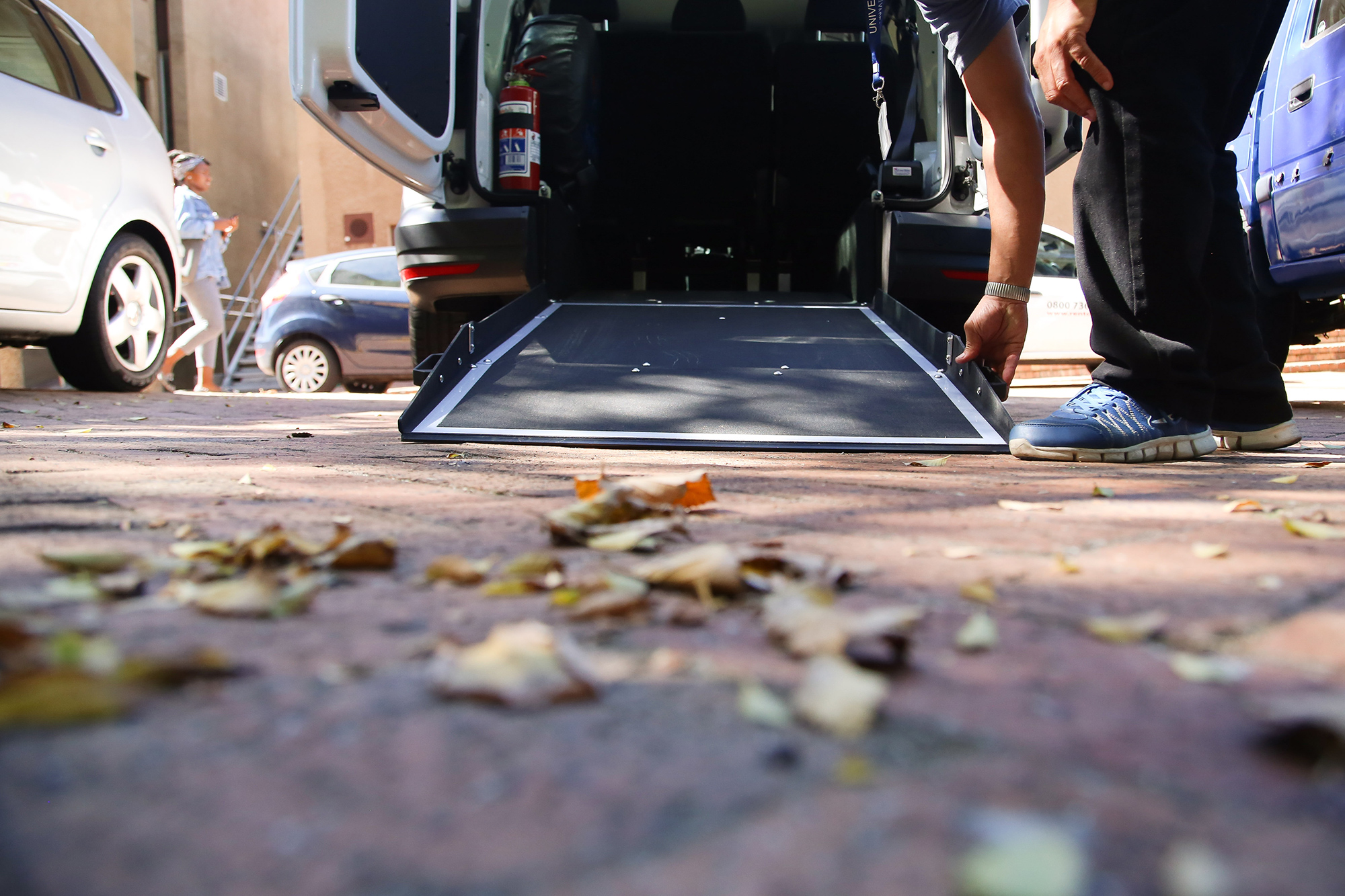
In addition, she said, for students and staff with dyslexia, the Read and Write Literacy software – a text-to-speech programme that provides visual and auditory feedback of text – is available to assist those who need it. Likewise, for students and staff who are blind or visually impaired, the Jobs Access with Speech (JAWS) and Zoomtext software programmes have been introduced to make their journeys at UCT seamless. JAWS is a computer screen reader programme that allows blind and visually impaired readers to read the screen, either using a text-to-speech output or a refreshable braille display, while Zoomtext is a fully integrated magnification and reading programme designed for visually impaired users. Meanwhile, in the classroom, she said, peer notetakers are available to assist students with hand mobility challenges, and in addition to a South African Sign Language interpreter, Deaf students can also make use of a real time text transcriber for notetaking.
“We don’t take any of these services and its contribution to students’ lives for granted. We are proud that we are able to support and service our students in a range of ways with the help of cutting-edge technology,” Modutle said. “We also encourage lecturers to continue providing all students with lecture transcripts. These are incredibly useful and mean that students with disabilities have much-needed access to their course material.”
Creating accessible buildings, venues
Because students have very demanding academic schedules and have more than enough to fret about daily, how to access UCT buildings should never be a concern – and thankfully it’s not. Modutle said buildings are designed to accommodate all members of the campus community, including those students and staff with disabilities.
“But power cuts pose a huge challenge because the lifts aren’t operational, and this really restricts wheelchair users from accessing spaces.”
“Most buildings within UCT are equipped with lifts to enable vertical access to different floors, which really helps students, staff and visitors with mobility impairments. But power cuts pose a huge challenge because the lifts aren’t operational, and this really restricts wheelchair users from accessing spaces. This creates unnecessary stress,” Modutle said.
But while Disability Service may not be able to turn the lights back on during a power outage, she said the service is committed to supporting students during other stressful periods. The Disability Service day house provides students with a safe, quiet space to relax and reflect after a long day, and if necessary (after major surgery), to write their tests and exams. More than that, the space is also used as a study space for wheelchair users, students on the autistic spectrum and those with specific learning disabilities. The day house only accommodates a handful of students, therefore, she said, students with disabilities are encouraged to make use of the special 24-hour study space in Hlanganani Junction on upper campus.
“Ensuring that our students are comfortable and that their needs are accommodated is very important to us. If they’re recovering from major surgery, or if they feel they need to hit the books studying at 02:00, there are spaces available for them,” Modutle said.
On the right track
As the world observes Disability Rights Awareness Month, she said UCT has come a long way with creating transformed and inclusive spaces. But the university still has a long way to go regarding eliminating the stigma associated with persons with disabilities. With advocacy, awareness and training, which has started in earnest, she believes that UCT is on the right track.
“Biases, stigmatisation, and attitudinal barriers are still preventing full inclusion of students and staff with disabilities. UCT needs to create more a humanising culture that is free from barriers. One way of doing this is by making Disability Service’s Disability Accessibility and Inclusivity training mandatory. That’s one way of speeding things up and getting us a step closer to where we need to be,” Modutle said.
After all, she added, UCT’s Vision 2030 speaks directly to the core values of the Disability Service unit.
“Persons with disabilities face immense challenges that make it less possible for them to unleash their human potential. But we have come a mighty long way and by building on what we have in place now, we are well on our way to making even bigger strides in the future and eliminating these biases completely,” Modutle said.
Other colleagues in the Disability Service unit who contributed to this feature include Denise Oldham and Noluthando Ntsimango.
 This work is licensed under a Creative Commons Attribution-NoDerivatives 4.0 International License.
This work is licensed under a Creative Commons Attribution-NoDerivatives 4.0 International License.
Please view the republishing articles page for more information.







